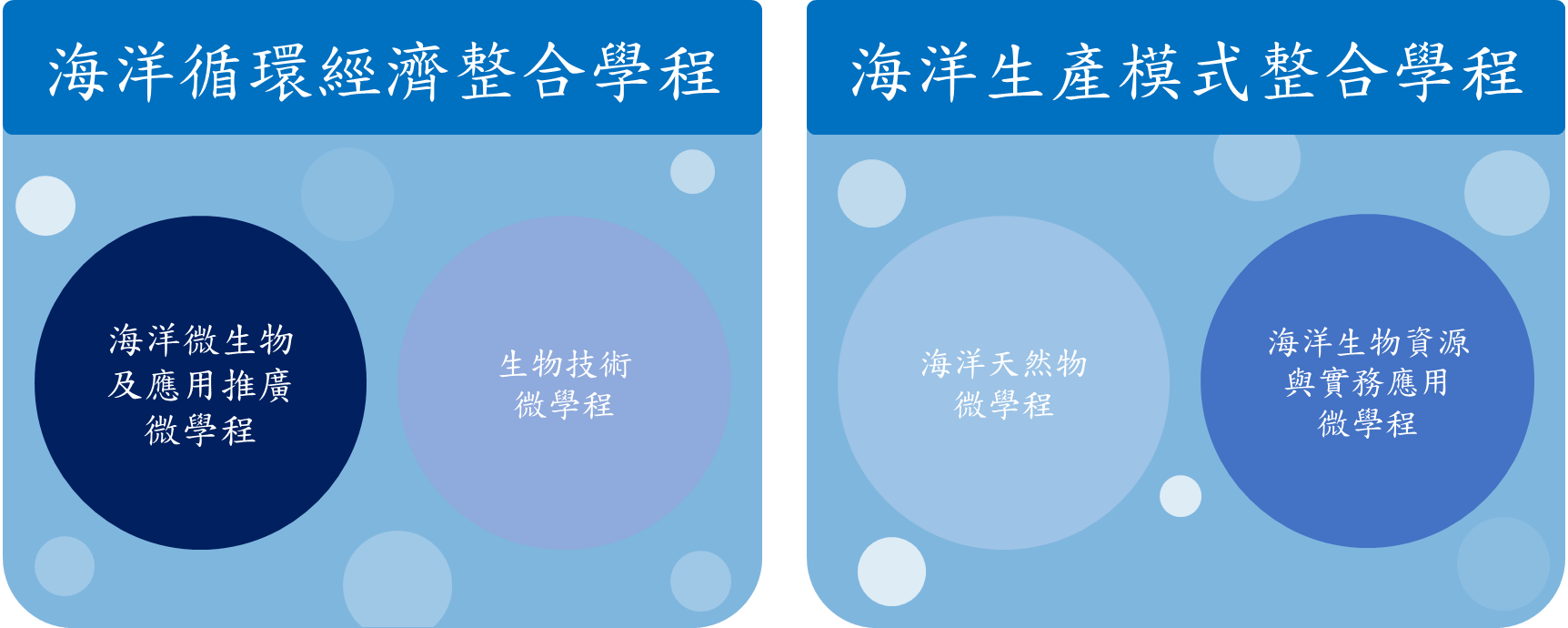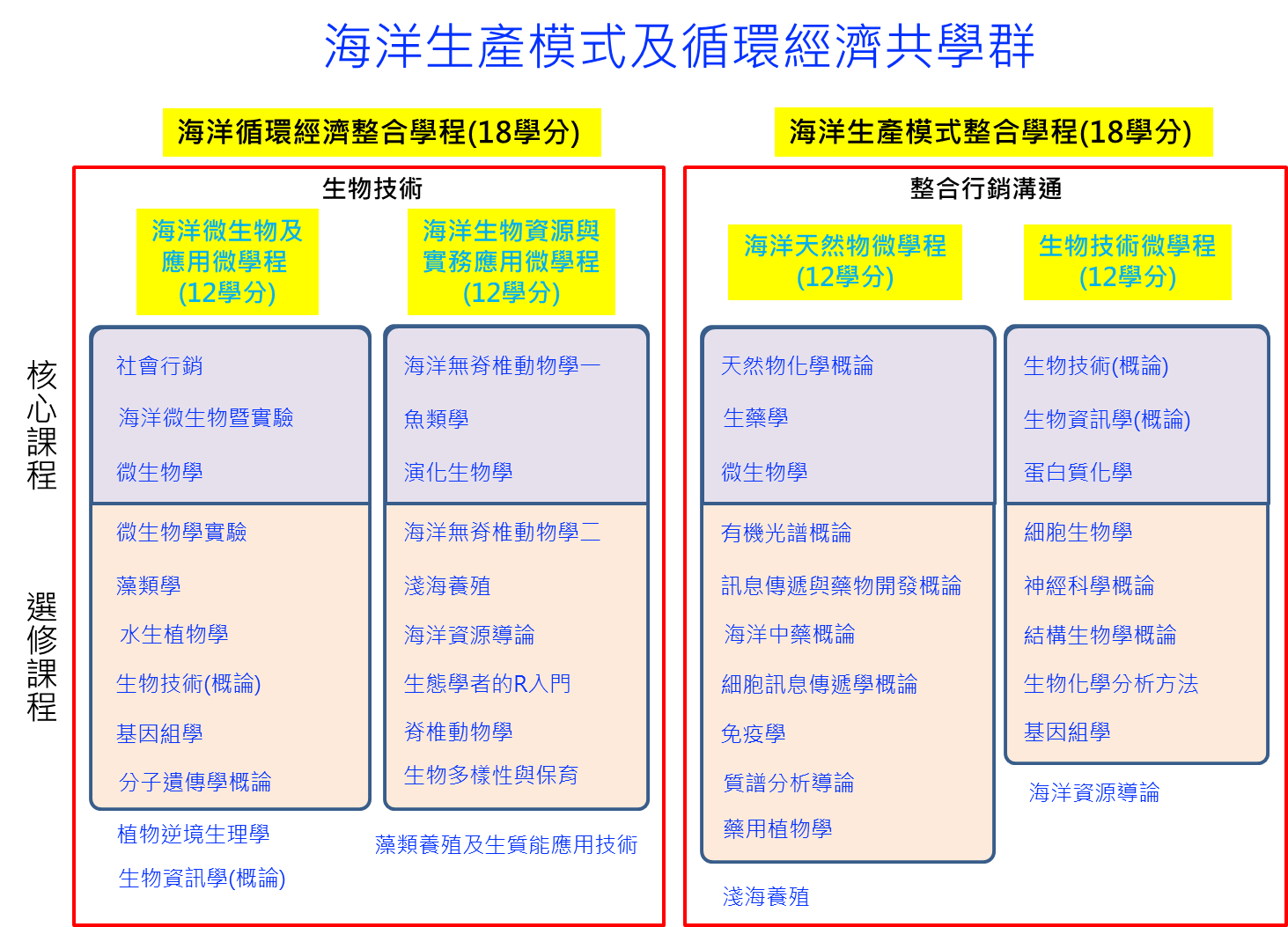
Marine Production Models and Circular Economy Learning Community (Updated: 2024.03.28)
Purpose:
Taiwan possesses a rich marine ecosystem with abundant natural resources, many of which remain unexplored yet full of opportunities. This initiative aims to explore the application of sustainable marine development and circular economy principles in global and regional marine resource management.
Objectives:
The goal of this learning community is to cultivate students with both marine science research expertise and product development thinking. This will be achieved through collaboration between faculty members from the university’s Marine Resources Department, Life Sciences Department, Chemistry Department, Political Economy Department, Business Management Department, as well as faculty from Kaohsiung Medical University and the National Museum of Marine Biology and Aquarium.
Program Coordinators:
-
Marine Microbial Applications Micro-Program – Prof. Wang Liang-Chun (Marine Resources Department) | Ext. 5035
-
Marine Biological Resources and Practical Applications Micro-Program – Prof. Liu Shang-Yin (Marine Resources Department) | Ext. 5024
-
Marine Natural Products Micro-Program – Prof. Weng Jing-Ru (Marine Resources Department) | Ext. 5026
-
Biotechnology Micro-Program – Prof. Li Jing-Qin (Marine Resources Department) | Ext. 5036
Program Structure:
Over the next three years, two integrated programs will be offered:
Additionally, four micro-programs will be available:
-
Marine Natural Products (13 credits)
-
Biotechnology (12 credits)
-
Marine Biological Resources and Practical Applications (15 credits)
-
Marine Microbiology and Related Applications (14 credits)
Each micro-program focuses on different aspects of utilizing marine biological resources. Courses will be jointly taught by faculty from the Marine Resources Department, Life Sciences Department, Political Economy Department, Business Management Department, Kaohsiung Medical University, and the National Museum of Marine Biology and Aquarium. The objective is to nurture students with a combined background in scientific research and product development. In the future, faculty and students will work together to innovate sustainable marine production models and promote circular economy practices, ensuring sustainable consumption and production, as well as the conservation and sustainable use of marine resources.
Program Type:
Specialized academic programs within departments.
Course Goals:
The curriculum for the next three years (2025–2028) will focus on equipping students with fundamental knowledge required for marine biological resource development. It aims to foster students' understanding of societal and industrial applications, preparing them to address real-world challenges. Students will be trained to develop innovative thinking and propose viable solutions, ultimately improving the economic and production models within the industry.


1. Innovation in Marine Pollution Prevention and Resource Recycling Technologies
Issue:
Developing high-efficiency, low-cost recycling technologies to address pollutants such as microplastics, heavy metals, and hazardous chemicals while promoting resource recovery and reuse.
Development Projects:
-
Developing marine plastic and microplastic recycling technologies, including automated collection equipment, filtration, and degradation techniques.
-
Promoting biodegradable material alternatives to reduce the use of persistent plastics.
-
Strengthening coastal wastewater treatment infrastructure to prevent harmful substances from entering marine ecosystems.
Relevant Courses:
Biotechnology, Algae Cultivation and Bioenergy Technologies, Introduction to Marine Resources
2. Innovative Applications of Circular Economy Models and Industrial Transformation
Issue:
Implementing circular economy models in the marine economy sector to reduce resource waste and enhance resource efficiency.
Development Projects:
-
Establishing a "Sea-to-Market" circular fisheries model to promote sustainable management of fishing and aquaculture industries while maximizing the reuse of fish and seafood resources throughout the supply chain.
-
Encouraging circular economy transformation in marine tourism, transportation, and leisure industries to reduce single-use products.
-
Promoting the recycling and reuse of discarded fishing gear to minimize the impact of "ghost fishing" on marine ecosystems.
Relevant Courses:
Social Marketing, Shallow Water Aquaculture
3. Marine Biotechnology and Compound Development
Issue:
Leveraging marine biodiversity and its unique adaptive abilities to develop promising natural compounds and biotechnologies for the sustainable development of the pharmaceutical, food, and materials industries.
Development Projects:
-
Exploring and researching marine natural compounds with medicinal value to develop biologically active drugs such as antibiotics, anti-cancer, and antiviral treatments, thereby increasing the added value of marine resources.
-
Promoting the sustainable utilization of marine biological resources and developing bio-based materials derived from seaweed and plankton, including renewable bioplastics, food additives, and functional ingredients.
-
Developing biodegradation technologies using specific marine microorganisms to accelerate the breakdown of marine plastics and harmful substances, contributing to ecological restoration.
Relevant Courses:
Pharmacognosy, Introduction to Organic Spectroscopy, Biochemical Analysis Methods
4. Marine Ecosystem Protection and Restoration
Issue:
Effectively protecting and restoring marine ecosystems affected by climate change and human activities.
Development Projects:
-
Expanding marine protected areas and implementing ecological restoration projects, particularly for vulnerable ecosystems such as coral reefs, mangroves, and seagrass beds.
-
Conducting deep-sea ecosystem monitoring and management while strengthening ecological impact assessments for fisheries and other marine resource exploitation activities.
-
Implementing carbon offset initiatives, such as blue carbon projects (involving algae, mangroves, and seagrass), to reduce carbon emissions and enhance carbon sequestration capacity.
Relevant Courses:
Biodiversity and Conservation, Ichthyology, Evolutionary Biology
Program Coordinators & Contact Information:
-
Dr. Li Yi-Ming, Assistant Professor, Marine Resources Department | (07) 5252000 #5213
-
Dr. Wang Liang-Chun, Associate Professor, Marine Resources Department | (07) 5252000 #5035





